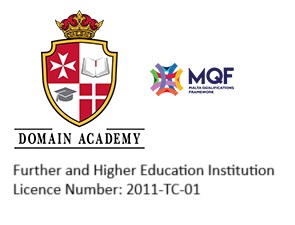Undergraduate Certificate in Banking and Finance
Undergraduate Certificate in Banking and Finance at Domain Academy Malta is aimed at those people in the later stage of their graduate programme, as well as professionals in the industry looking to enhance their knowledge and experience in the field. This course is also suitable for students who wish to pursue a career in the financial services industry.
Intake
March & October
EQF / MQF Level
Level 5
Mode of Delivery
Traditional
Duration of Course
6 Months, 3-hours, Twice a Week (Full-Time and part-time options available)
Operational End Date
N/A
N/A
ECTS Credits
30 ECTS
Programme Qualifies for
Get Qualified Scheme
Certificate after completing
Student Success Rate
98.5
Intake
March & October
EQF / MQF Level
Level 5
Mode of Delivery
Traditional
Duration of Course
6 Months, 3-hours, Twice a Week (Full-Time and part-time options available)
Operational End Date
N/A
N/A
ECTS Credits
30 ECTS
Programme Qualifies for
Get Qualified Scheme
Certificate after completing
Student Success Rate
98.5
Course Description
This programme provides students with an understanding of how the financial markets operate, the key players and the issues that they are currently facing. Throughout this course students will be exposed to various elements of the financial word including money and banking and the different types of financial markets and instruments used in this industry. An important underlying aspect of this course is the Maltese laws and regulation which govern the industry. Furthermore, throughout this course students will also be exposed to equity market derivatives, which are complex investment vehicles being used in the financial services industry. This course also addresses anti-money laundering practices including terrorist financing and sanctions. Students will be made aware of various sanctions that exist and different ways how to combat money laundering and terrorism financing. Upon completion of this programme students will have a vast knowledge of how the financial system and the keys players operate, the importance of anti-money laundering and different ways howto value investment projects.
Overall Programme Objectives:
a) Develop a comprehensive understanding of the banking and finance industry
b) Understand the local financial regulatory framework
c) Explain the roles and functions of various financial markets.
d) Build an ethical approach to banking and finance by identifying fraudulent financial activity and money laundering activities.
This programme has modules which can be taken indipendently as awards.
Target Group:
Learners who wish to widen access to higher education and improve the career prospects within the finance sector.
This qualification is ideal for learners who have obtained the matriculation certificate or relevant qualification at MQF/EQF Level 4 and would like to peruse a progression route to a degree-level study in Finance. It is also suitable for mature learners who are currently employed and wish to change or advance their career in the financial services industry.
Target Audience:
- 18+
Course Language:
English
Where you will learn:
What you will study
How will you learn
This diploma is delivered with a flexible classroom-based method, through a variety of course materials, case studies, discussions, presentations, enquiry-based learning and problem-solving activities. We provide you with key reading and research activities, and you will make the most of our own teaching portal.
Where you will learn:
Lessons will be held in class in our premises at Domain Building, 102/104, Constitution Street, Mosta.
Assessment
Formative assessment
The goal of formative assessment is to monitor student learning to provide ongoing feedback that can be used by lecturers to improve their teaching and by students to improve their learning and development. More specifically, formative assessments throughout the modules will:
– help students identify their strengths and weaknesses and target areas that need improvement
– help lecturers recognise where students are struggling and address problems immediately
Summative assessment
Assessments will be designed according to the guidelines of each module specification. In general, the assessments will enable learners to demonstrate achievement of learning outcomes across the individual elements of the program. The range of assessments utilized will normally include essays, reports, presentations and other structured assignments.
Assessments are drafted in conjunction with the curriculum development department and tutor concerned. Final version is confirmed by the curriculum development department.
Assessments are moderated by tutor concerned, then also verified by the Internal Verifier.
The assessment will be based on assignment for each module. There may be one or two assignment for each module.
The assignment will consist of criteria related to each topic within the module with the respective outcomes.
Entry Requirement
Relevant qualification at MQF/EQF level 4; OR
At least 2 years relevant Industry Experience as defined in Domain Academy’s RPL.
If English is not your first language, you will need to sit for an internal English assessment.
Fees & Funding
MFHEA Licence Nº: 2011 – TC – 01
Further and Higher Education Institution
Listen to what our past students had to say;
Domain Academy proudly collaborates with:



28 Years
of Excellence
8,000+
Satisfied Alumni
98%
Student Success Rate
250+
Active Students

















